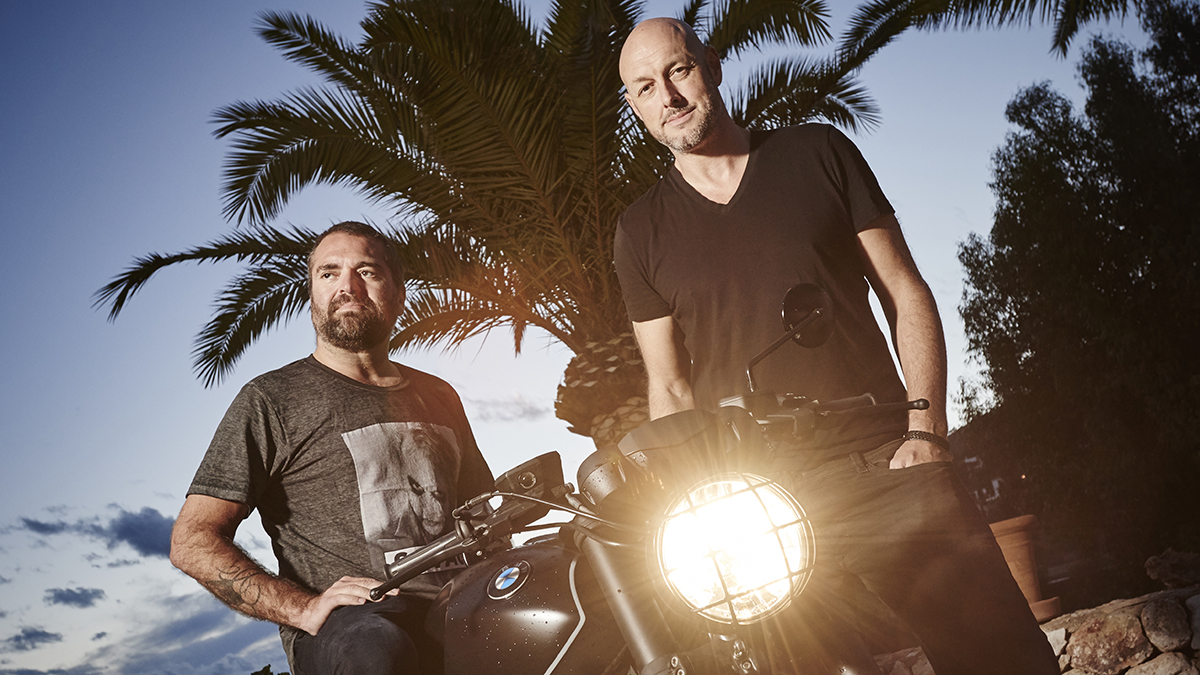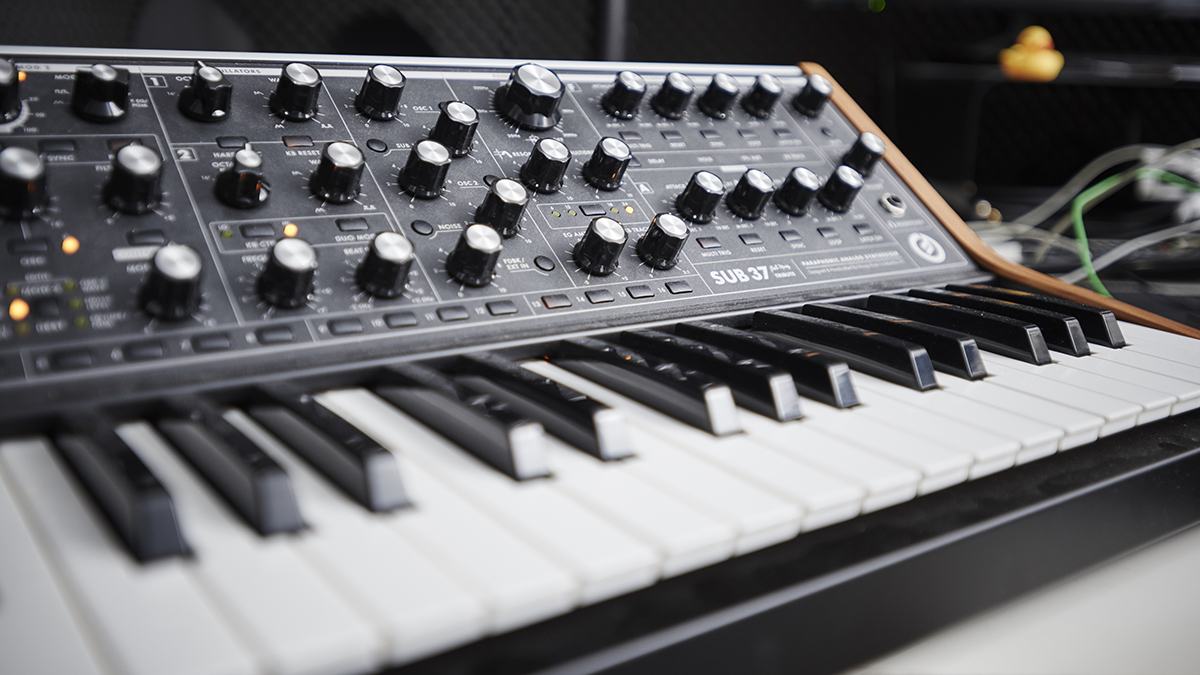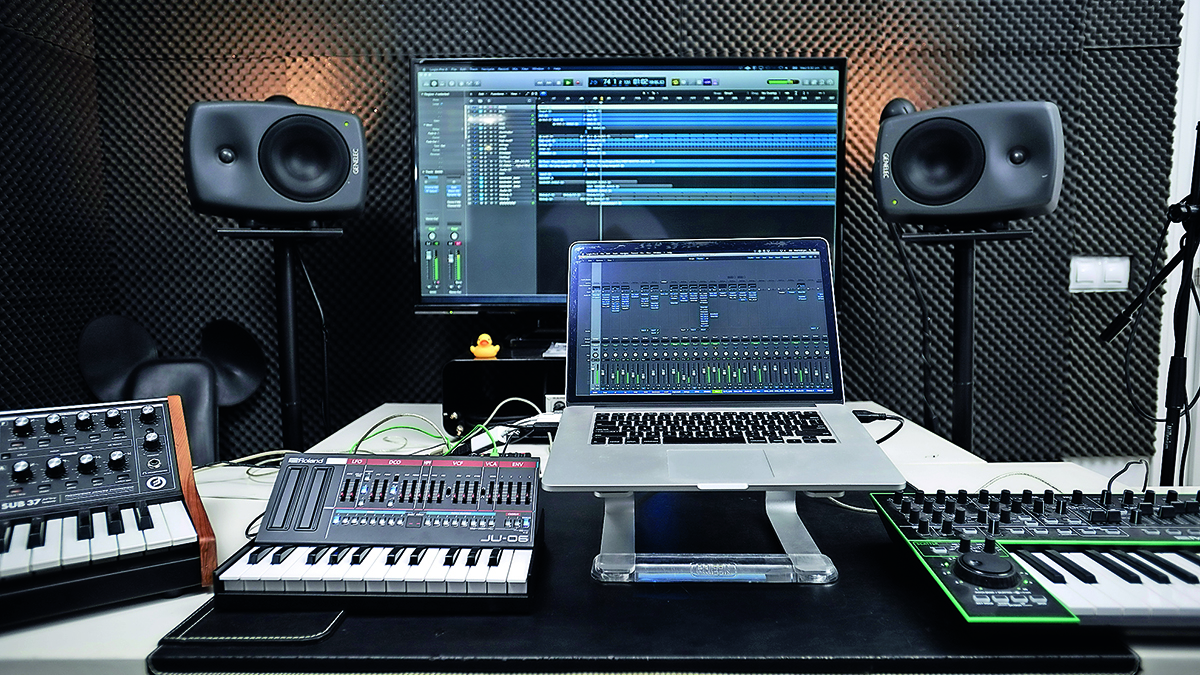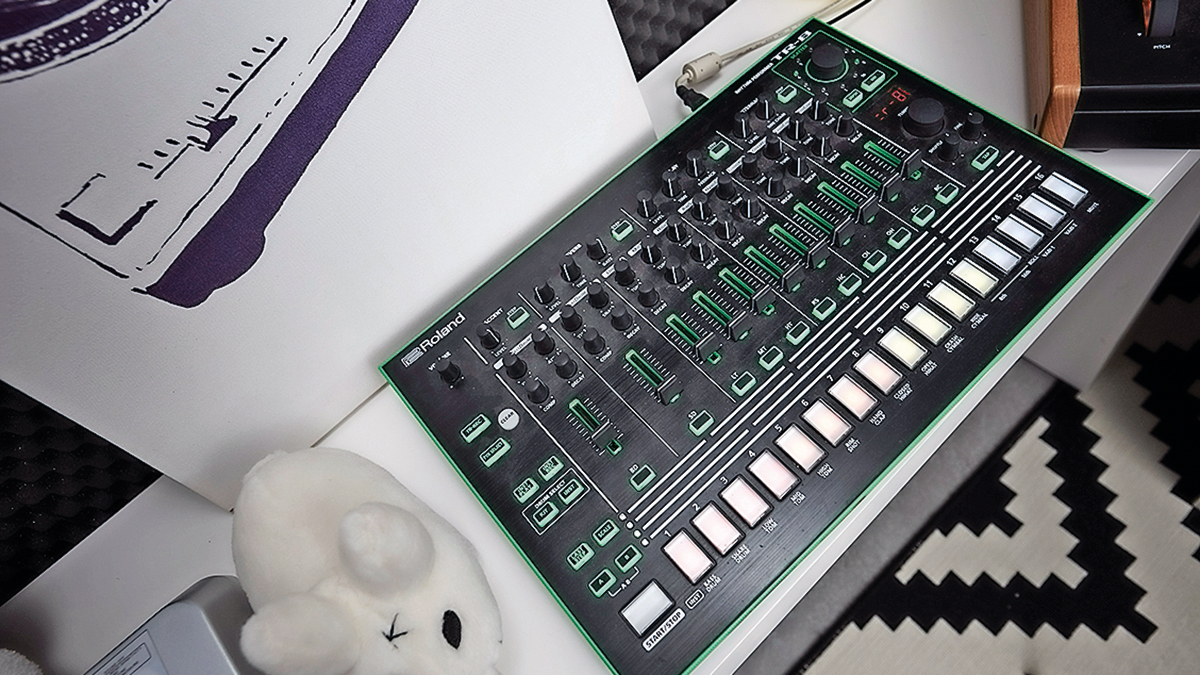Pig&Dan on what annoys them about other DJs and writing tunes on planes
Unconventional techno producers go back to their roots with new record

Want all the hottest music and gear news, reviews, deals, features and more, direct to your inbox? Sign up here.
You are now subscribed
Your newsletter sign-up was successful
For over a decade, Pig&Dan (Igor Tchkotoua and Dan Duncan) have been jamming in the studio and bringing it to the masses with their own special synergy.
Best known for their techno productions, the duo are also recognised for blurring the boundaries with their unique take on tech house and downtempo/lounge. Flouting convention, they're as comfortable working in planes, trains and automobiles as they are a nice comfy studio, even if that studio happens to be a makeshift hotel room.
With their hectic global DJ schedule no obstacle to writing new material, new album Modular Baptism sees them take another left turn. Returning to their techno roots, Pig&Dan apply their infectious passion to the world of modular recording.
How is Mallorca treating you? Would you recommend it as a DJ/production base?
Dan Duncan: "Yeah, we both live in Mallorca basically, but our production base is literally my laptop because we fly so much that we often write on planes.
"It's a weird one because living in Mallorca we're not influenced by trends. If you're in Berlin or London or NY you're always surrounded by crews of people doing things that are hot at the moment. It's been to our advantage from the very beginning that we've just made the music we wanted to make. But honestly, a studio is a studio."
Igor Tchkotoua: "For me, producing music is about being inspired or not being inspired. It doesn't matter where I am, it's whether I'm inspired and connected to that vibe, so my surroundings don't make that much difference.
Want all the hottest music and gear news, reviews, deals, features and more, direct to your inbox? Sign up here.
"I always say it's about the ideas you have. DJ Ricardo Villalobos once said 'everything's a remix of everything'. I like to compare music to food; you have different genres or nationalities, but the way the chef interprets it is what differentiates him from everybody else.
"In techno, you can make a track with a stab, but a particular artist will add a certain effect, delay or reverb, close it with a filter and then distort it - so the post-production of that stab is what makes it special, as opposed to a typical Detroit stab."
If everybody is influenced by somebody else, is it possible to be original?
DD: "I think so, but there are only 12 notes right? There's loads of chords, but in reality the tones limit everything don't they? It's like Igor said, it's what you do to that tone and the way you put it together."
IT: "A very important thing for me is the material you are using, the sounds. Like with food, if you have a good base, like good meat, you don't need to add so many spices or sauces to it. If you start with a really good analogue stab from a good synth and get a really fat sound out of that, then you don't need to post-process it as much as you would if you sampled some crappy sounding MP3."
What was your first entry into gear?
IT: "Basically, I started DJing when I was studying business at university in London and spent most of my time going to Soho and buying vinyl in Black Market. I started mixing with really crappy decks, they were like belt drives, not 1210s that's for sure, but they were great for learning on because you had to be so refined.
"Anyway, instrument-wise my first contact was working in a rock studio in Germany. They were recording vocals on Logic but guitars and drums on a tape recorder. So that was like a tutorial for me of how to record real music with tape and a massive mixer. I remember them having Genelec speakers, and from there I started with a PC and Logic and a MIDI keyboard."
DD: "I started with CV gate, 909s and 303s. My first contact with an instrument was the piano, because I studied it from four years old. Then I went down the same avenue as Igor and worked in a studio in London doing big cheesy pop records learning about editing and cutting tape - I've still got the razor blade scars on my hands.
"I started from the very beginning of the electronic scene, so I remember when the first Akai sampler came out and moved on to the Atari and Cubase. I actually used to work for Cubase, because there were only two programmers in London who were doing that professionally, so I used to give them a lot of feedback. But, for me, moving to Logic was a big advancement. Although people do argue that Cubase is phenomenal, we're Logic lovers and we love the sound of it."
The last album, Destination Unknown, was pretty downtempo; would you say that Modular Baptism goes back to your techno roots?
DD: "I think we're techno artists and always have been. We've always come from the dance realm but Destination Unknown was an album we reached out to because we'd made a load of tracks together with other people but never found the right avenue for them. It was actually John Digweed that wrote us an email saying he was thinking of doing an album of chillout or downtempo records from techno artists.
"I came from a family of soul music; my dad was in Average White Band, so I grew up in that whole scene. Igor and I always refreshed our sound by making downtempo tracks every so often."
IT: "Each type of music has a set of rules, but our mentality is that you can make anything you want, there is no limit. If you want to make jazz you can make jazz, and then you give it your own style.
"All our albums are like that. We just make music and compile it and say, wow this could be an album. We're not a band that lock ourselves in a studio for ten days and say we're going to do an album now. And John Digweed wants another downtempo one now, which we are already thinking about."
Is techno an area you look to innovate in or are you looking to stay faithful to its generic roots?
DD: "We always push the envelope."
IT: "I don't even want to call it a genre; we make music and that's it. What is techno nowadays? Is it 170bpm Berlin techno? The purist will say our music isn't techno, that it's between that and tech house. My interpretation of a deep house track is going to be dubby techno - the old-school deep house, not now.
"It all evolves. For me, house music was Paradise Garage, Larry Levan and Mr Fingers. Now you listen to house and it sounds like EDM."
DD: "Adam Beyer did a podcast the other day and featured a mix of ours. He talked about what he thought Pig&Dan was, and said the thing about Pig&Dan is that, whether it's house, tech house or techno, it has a certain signature sound. And I think we're really lucky because that means we don't always have to be tied to a genre."
IT: "There's so many factors; it depends on where you are and your audience. If you're in a bloody factory, you're not going to play anything happy - you're going to play something harder and more industrial. You've got to feel it. It's about psychology; if you go to a Rolling Stones concert they'll have an intro, then play their hits, then a decline, then they'll have a climax and a conclusion. And it's like that with everything. Everything has a structure; sex has a structure, food has a structure - you have hors d'oeuvres, a main course and a dessert, and then you can fuck around with that."
So what do you make of EDM?
IT: "It's appealing to Joe Bloggs. It's all high frequencies; it's for the young people. When I was 13, I used to listen to Hardcore, bands like Thunderdome."
DD: "And gabba. Mate, I've got into some really bad music [laughs].

When I was 13, the choice came to me. Does the mainstream give the same choices now?
IT: "Not really, it's all marketing; I agree with what you're saying. In EDM, it's all about branding; they buy their careers and half of them have ghost producers. It's like everything, it's a cycle. There are guys that are actually admitting to it, that they're not even DJing.
Look at Steve Aoki; no offence to him, but he said that he plays a role - he's an entertainer, but you can't call him a DJ. He probably has someone putting his set together and then he presses play."
"Look at Steve Aoki; no offence to him, but he said that he plays a role - he's an entertainer, but you can't call him a DJ. He probably has someone putting his set together and then he presses play. I'm not going to name names, but we were told at a festival that a lot of these guys have pre-mixed sessions because they don't want to fuck up, and that's how it is. It's like pop music; it's playback. We're making a lot of friends now [laughs]."
On the new album you'd just play for hours, record everything and select the best bits?
IT: "Exactly, but we'd do it in layers. For the song Growler, we wrote it on a Roland System 100 from just a riff. To not waste time in the creative process, we sampled a kick drum that already sounded good from a master track and started building the track. We'll record live, but we like to have it in audio because with MIDI you can lose it.
"Once you have it in audio, it's cemented. So we'd do one riff then build another one until we have these three, four or five-minute strips, fucking around with the octaves, opening and closing the cut offs, the waves and the release. After, we'll do this jamming session, clean the track up and go more into the mixing and post-production process."
DD: "There were tracks where we were both physically playing three and four minute solos, which was great fun I've got to say. The thing is, our creative process is quite fast, so what we love about working this way is that you can really get your teeth into it."
IT: "We also used a mini Korg, the Moog Sub 37, the Nord Lead and the Moog Sub Phatty. We haven't got into Eurorack. We'd love to but I can't afford to buy that much stuff. We also have a Roland TR-8, I forgot to say."
So your new album, Modular Baptism, implies you've been getting into modular gear, right?
DD: "That's exactly what it is. The whole basis for the name of the album was because most of it was done on synthesizers twisting knobs. If you look at some of the tracks, they're not even sequenced, we didn't sample anything. To come back to your question, how do you become unique - if you've got that same exact sound, you can be different depending on what you do with the knobs."
IT: "It gives it more of a human touch; it's like a live session feeling. The problem is, once you've recorded it you can't do it again in the same way. We have a really simple set-up. We wrote some of the album in Mexico and created a pop-up studio at a friend's house. We had a Moog, a Nord Lead, a couple of speakers and the laptop. We basically just started jamming and recording there, and four tracks came out of that."
How did you find using modular in terms of sound quality?
IT: "That's the whole thing about what I was saying - like a steak you know? If you use a fine steak, you don't really need to do that much to it and the sound you get out of a Moog is just brilliant. But to get that Pig&Dan sound, there is still a lot of processing to do afterwards."
DD: "There's a couple of go-to plugins, but because we both come from the old school we'll still use AMS delays and real, proper Manleys - stuff from the analogue days. We go back to using a lot of the UAD plug-ins, just for adding that tube warmth, which really lends it itself to techno.
"Our mastering engineer says he really notices it when we send him stuff that is out of the box and has a lot of tape emulation, something that's going to crunch it up a bit more."

Which plugins are you excited about using?
DD: "The absolute killer for making things sound dirty is Kombinat by Audio Damage. It's an amazing plugin that I shouldn't even be telling everybody about. It adds a gritty edge to pretty much anything you put in it. You can choose how it distorts the low, middle and top-end, so it's kind of like frequency compression, but it's a frequency distorter. And you've got a ridiculous, over-the-top compressor on it.
"When you have a live recording that goes from just a subsonic bass and opens throughout time into something that is very melodic, putting this on brings everything to the front. The Eos reverb from Audio Damage is also amazing, and the Ratshack reverb - because it's not a synchronised delay and reverb, you can do echo on it that moves the sound by milliseconds which adds a great effect."
I understand you're also Soundtoys fans?
DD: "I love Soundtoys but we also use a lot of FabFilter plug-ins, and have you heard of ToneBoosters? They're a set of free plugins I found on the internet. I downloaded them for a laugh, but their tape emulators are maybe even better than UAD or Slate Digital's. They've got a sound to them that's incredible for warming up kick drums and sub bass. We also like Waves SoundShifter; for pitch shifting it's the best one out there."
IT: "We love playing around with octaves you know? Especially on vocals and melodies. Sometimes we've already recorded in audio and don't want to go back to MIDI, so we'll just put the Waves pitchshifter on and it works perfectly and makes things really quick and easy."
DD: "That's actually Pig's favourite saying in production, 'What about if we try an octave lower?' [laughs]. Some of our biggest tracks to date are singular-riff tracks, like Growler or Sandstorm, which are built on one riff evolving and exploding with reverbs going off it. It enables a person to get really locked into that one sound, but there's a lot more going on behind it than people think; we'll probably have two or three octaves running in the background and combining to make one sound.
"We use a lot of the Brainworx stuff; they're made by a very clever team of guys from Berlin. But our mastering guy, Beau Thomas, is the guy that makes us sound much better than we actually are."
IT: "How do you compete with £90,000 speakers?"
DD: "Yes, but if you look at his equipment, it's the circuitry it's going through. I noticed this from my analogue days; you didn't even have to activate some of the EQs and limiters they had back then. They do what they're designed to do - colour sound in a certain way that is sexy. Yeah, you can go and spend £100,000 and have this stuff at home, but at the end of the day it's always good to have a fresh pair of ears to overlook things."
Do you mix as you go?
DD: "Funnily enough, I'm mixing most of our tracks with headphones these days, which is shocking, but I've got so used to working on aeroplanes and in hotel rooms, so we use that downtime to our advantage.
"I'm using Sennheiser HD25s - the aluminium ones. Beau said my mixes have got even better than when I was mixing on Genelecs. I did a mixdown and sent it to him and told him I'd changed my monitors, but he said it sounded much better than it normally does and that the sub-end was much tighter.
"Of course, when you're making dance music you're playing in rooms with huge amounts of reflection and echo, so having a very tight area is super important because you play it on fat systems. If it's all waffling around, it's a nightmare."
What is the benefit of mixing on headphones?
DD: "You're not dealing with any room, so you haven't got any of those issues. Even though my studio is really well built and doesn't have any reflection, you're still dealing with air moving around a room. I am from the old school, working with Yamaha monitors and NS10s, and I understand how to work with them, but for some reason with headphones you can create a higher impact mix with less room in it; it's just tighter. I don't think many people would agree with that funnily enough, but it's what you're used to."
IT: "The thing is; we make music so we can play it. We don't just play with Ableton and all that. We tried, but it felt like we were acting. We had a bit of a live set-up with a machine playing samples and we were filtering and playing with delays and reverbs, but we don't feel comfortable with that.
"We like the fact that we can DJ, change the set a little bit and be more flexible and test our music. We've finished a track on a plane, Dan mixed it down on his Sennheisers and we've played it the next night."

So what are you using when you DJ now?
IT: "Just CDJs. We're very simple - I still have my 1210s at home. But nowadays to travel with vinyl is a pain in the arse; I'm not going to put my vinyl in the baggage lock for someone to steal, so we're comfortable with USBs.
"We also tried Serato, because one day we arrived in a massive club - it was a mansion in Miami with 3,000 people, and the guys said they didn't have any needles. So I had my Serato set up and thank god there were a couple of CDJs there, so I just took my hard drive, stuck it into the CDJs and fell in love with it as it was so simple. And also, the bloody fact that when you're DJing people will come and change the cables through the back of the mixer; I fucking hate that."
DD: "It's so annoying when there are other DJs leaning over you; I'm like, hey mate I'm communicating... with thousands of people."
IT: "Yeah, 20 minutes before you've finished your set someone comes in and starts setting up cables in front of you, or when you have to do it and Serato doesn't work because the bloody little circle doesn't come up on the screen and you lose your vibe. So now we just get there and boom!"
DD: "Two CDJ 2000s sound amazing. Their converters are outstanding compared to other set-ups like Traktor or Serato. We use an Allen & Heath mixer - XONE:92, no effects, no looping and no pretend build-ups. We play records that have enough production in them, so we don't need to add. We're old school man; we play records, we really do."
You must have chemistry in the studio; it's like sex man - if you don't have chemistry with someone it just doesn't work, and that's the same with music."
IT: "Traktor sounds like a tin can. For us, it's just old-school DJing, but we create our own set by making our own music. So if we've been making very linear and melodic tracks, we can decide to do something a bit harder. We're constantly designing and seeing what we need and don't need."
Do you still have to work on your partnership, or does it all come very naturally now?
IT: "Now, yeah. We basically know what the other one is going to think before we even do it."
DD: "Igor will write a track on his own, but it's like we both wrote it because we know what the other one is thinking so well."
IT: "He has a little Pig saying, 'that's really cheesy, don't do that', and I've got a Dan going, 'yeah I don't like that' or whatever.
"At the beginning we used to have fights and argue during the creative process. We'd be working on a track for two or three days, and suddenly I'd go, 'it's crap'. But we've worked through that - the work we had to do was with the egos.
"Creating is about creating and destroying and creating again. But if I said it's crap, we'd still keep one element and maybe that element would make the track. You must have chemistry in the studio; it's like sex man - if you don't have chemistry with someone it just doesn't work, and that's the same with music."
Elsewhere on MusicRadar
How to create a pro-sounding mix using free plugins
The 50 best VST/AU plugin synths in the world today


Future Music is the number one magazine for today's producers. Packed with technique and technology we'll help you make great new music. All-access artist interviews, in-depth gear reviews, essential production tutorials and much more. Every marvellous monthly edition features reliable reviews of the latest and greatest hardware and software technology and techniques, unparalleled advice, in-depth interviews, sensational free samples and so much more to improve the experience and outcome of your music-making.
